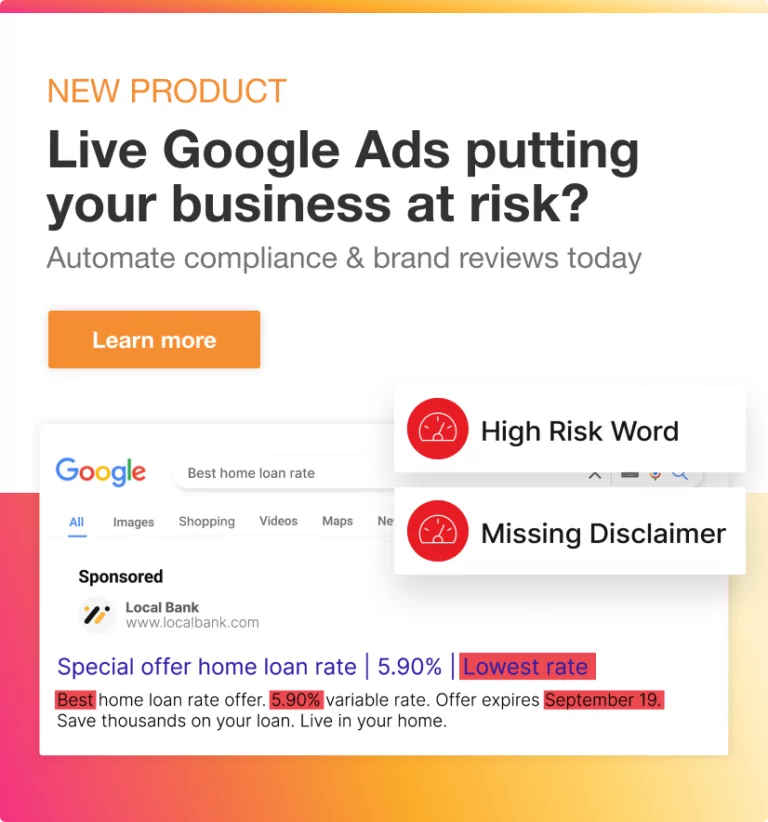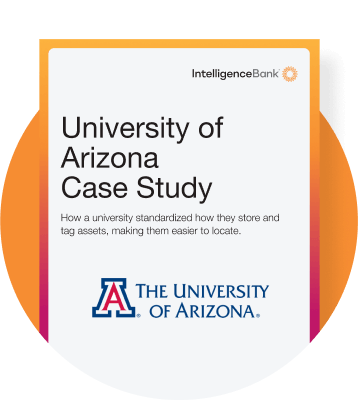Marketing compliance involves sticking to legal regulations, guidelines, and industry standards set by government and semi-government bodies. They are often complex, lengthy and subject to frequent change. As well as legal compliance, marketing compliance also refers to brand compliance. That is, ensuring all guidelines such as logo usage, color pallet, tone of voice etc. are consistent across all mediums. Marketing compliance software is central platform that helps you manage both legal and brand compliance so you can get great content out the door fast.
Born out of a real need from organizations to formalize yet simplify the processes around legal and brand approvals, they help you navigate all the complexities via a combination of integrated workflows, automation and AI. There are a range of solutions that work together to streamline the creation and approval – some can be used in isolation and some as part of a wider marketing workflow solution.
Ultimately, we believe most marketers want to do the right thing by regulators and their customers. But the reality is, many are under-equipped to deal with the sheer volume of content being produced.
What are the Top Marketing Compliance Challenges?
IntelligenceBank was developed by ex-marketers who have walked among you and lived the chaos that obtaining legal and brand approvals can bring. While there are nuances in the issues marketer’s face, there are some common themes. Here are the issues we see time and time again:
Keeping up with complex and evolving regulations
One of the primary challenges is keeping up with the ever-changing menu of mandated rules. Laws governing consumer protection are, rightly, subject to frequent updates and amendments as products and technology evolves. If you’re a national or global company, there’s the added complexity of regional variations. Without streamlined processes to keep abreast of current rules things slip through the cracks. This is usually when regulators step in to issue notices of compliance breaches.
Remaining accurate in the face of increased content volume
Creating advertising materials with the assistance of GenAI means marketers can produce more content faster than ever before. Although this increase in productivity aligns well with the content required to fuel the swing towards greater digital ad spends, it leaves those manually reviewing brand and legal content compliance reviews under extreme pressure. While the vast majority of marketers don’t set out to mislead their customers, sometimes errors or assumptions are made that result in either an ambiguous headline or the wrong terms and conditions applied to content. The reputational fallout from customers and the media can do damage that is difficult and expensive to unravel. I
Intellectual property and copyright infringements
Unwittingly using talent, voice over, photography, music or any other material out of license is frighteningly easy to do. And once you’ve used them, the supplier has you over a barrel in terms of paying up post-use. Keeping accurate records that travel with assets can be a challenge for those using basic file storage systems such as Dropbox of Google Drive.
Making sure partners are compliant
The rise of brand collaborations and social media influencer marketing has introduced new challenges. While content needs to fall in line with a creator’s style and audience, it must remain legally compliant and transparent. In some jurisdictions, it’s the advertiser who is liable for any legal compliance breaches an influencer makes. And with mid to large brands are typically jugging anything from 20 to 100 plus partners with varying degrees of professionalism, remaining compliant is a nightmare.
Feedback loops with in-house legal
Legal and marketing are at times a house divided. Lawyers are highly trained individuals don’t want to have to manually ratify the same terms and conditions or fine print on hundreds of pieces of collateral. At times, these tasks are seen as a low priority sit and the bottom of a pile of ‘To Dos’ causing production bottlenecks to occur. Likewise, marketers want to move quickly to get campaigns live and at times don’t factor in the detail and review times. Without marketing compliance software to streamline and automate processes, time is wasted and deadlines can be missed.
No helicopter view of compliance
When marketing material is scattered in share drives or information buried in email chains and presentations, team members have no ‘mission control’ or ‘central source of truth’ to refer to. This wastes valuable hours cross-referencing and often missing critical information.
Set and forget
Live moves pretty fast in marketing, yet at times live or ‘always on’ content can get overlooked when there is an amendment to regulatory codes or brand guidelines. When there are no systems to review work in field, brands can be tripped up by old Google Ads or online product brochures that are no longer relevant.
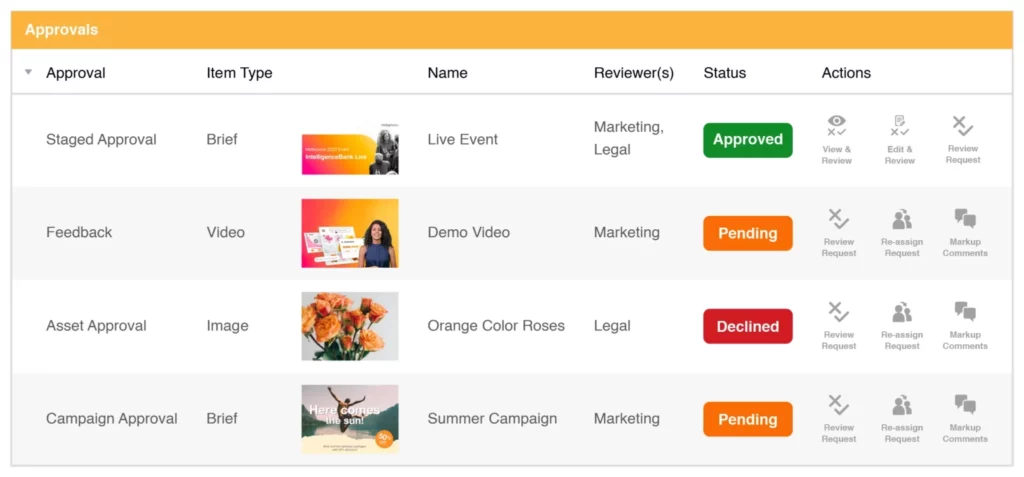
What Types of Marketing Compliance Software is available?
There are solutions available that are either stand alone functionalities or ones that thread together and feed into a marketing workflow.
For simplicity and continuity of service, choosing a marketing compliance software solution that has most (if not all) of what you require is the best path. One that allows you to customize from their menu of options – even better.
AI-powered content review software
Automating compliance reviews is one of the best ways to save time, reduce risk and increase accuracy. This software uses the power of AI to provide alerts when it detects vulnerable material and suggest compliant alternatives.
AI-powered compliance reviews can be performed at any stage in the production lifecycle – from briefs, to developing creative and even once material is live. Reviews can be performed on a wide variety of formats such as Word docs, presentations, PDFs, web pages, live Google Ads and more.
Companies can opt for existing rule packages, (i.e. those tailored to specific regulations), those that are completely bespoke, or a combination of the two. They can be all be adjusted for sensitivity to certain areas that are important to your brand.
Marketing compliance workflow software
IntelligenceBank is unique in truly end-to-end platform that brings digital asset management (DAM), brand management, marketing work management, and marketing compliance together. Marketing compliance can be managed throughout all stages of the production lifecycle by centralizing and interconnecting everything that happens from brief to post launch. Without getting into the weeds of every compliance functionality, here is an overview of how everything works in concert:
- Online briefs can be pre-set with compliant terminology and include links to brand approved assets and set lists of approvers. The status of every brief can be managed on customizable kanban boards and calendars for full visibility.
- Approved assets (such as photography, video, music, illustrations etc.) are held in a digital asset management (DAM) system and tagged with rich information about contents, specs and usage. Briefs can also link to dynamic and downloadable online brand guidelines.
- Briefs can be populated with pre-approved terms and conditions based on items selected from a menu.
- Creative templates holding pre-approved, semi-locked digital and print layouts can be made available for stakeholders wishing to make small local updates yet not have to request legal or brand approval.
- Proofing and mark up tools helps all team members get a visual on the latest versions and who requested what change.
- Integrated into the marketing workflow, AI-powered legal and brand compliance reviews replace manual ‘red pen’ reviews for documents, print and web content.
- Content and collateral trackers help marketers remain compliant by providing an automated overview of content review dates.
- Come audit time, campaign trails are easily retrieved to demonstrate compliance.
Marketing compliance software also integrates seamlessly with popular content creation software such as Adobe and Canva and provides full visibility for all stages of the production process under one roof.
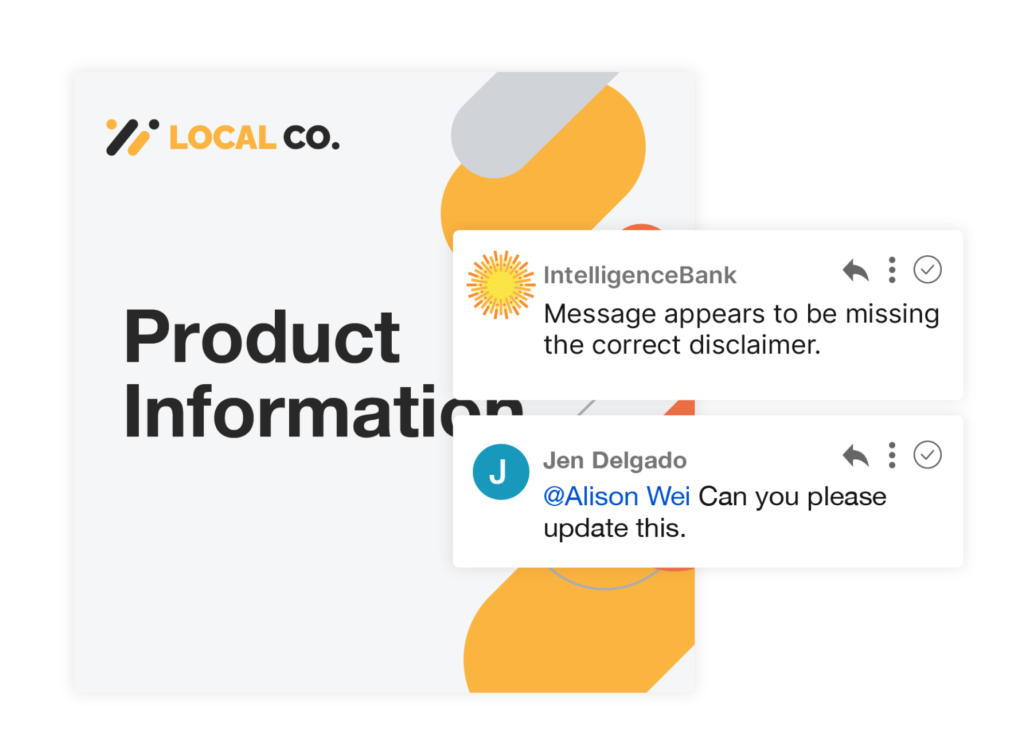
What are the Features of Marketing Compliance Software?
This software is designed to empower marketing teams by providing robust features that make it that much easier for teams to meet compliance standards. And of course making it easier goes hand in hand with less time wasted on manual methods of review and management.
Real-time monitoring and alerts
Marketing compliance software keeps an eagle eye on regulatory changes and very quickly notifies marketing teams about any updates that could impact their campaigns or content. This feature ensures that organizations stay informed and can adapt their strategies to remain compliant with evolving regulations.
Automated compliance checks
One of the essential features of marketing compliance software is its ability to perform automated compliance checks on marketing content and campaigns. By using advanced algorithms and keyword scanning, the software can identify potential compliance issues before content goes live, reducing the risk of inadvertent violations.
Centralized content review and approval
Marketing compliance software streamlines the content review and approval process by centralizing collaboration between marketing, legal, and compliance teams. The software allows you to proof and markup work and compare versions side by side. This feature ensures that all marketing materials undergo a thorough compliance review, minimizing the chances of non-compliant content being published.
Integration with existing marketing tools
When software talks to each other, it’s almost the same as when marketing, sales, legal and IT departments all get along. Integration dials up efficiency and avoids forcing people to work in silos. Marketing compliance software seamlessly integrates with most existing marketing tools and systems which avoids double handling. It ensures smooth data exchange between platforms and optimizes compliance workflows.
Collaboration and communication tools
Everyone in marketing knows the importance of communication. Marketing compliance software facilitates collaboration and communication among many functions such as marketing teams, legal departments, and compliance officers. It provides a centralized platform for feedback, approvals, and communication which ultimately fosters a cohesive approach to compliance management.
Audit trails and tracking
The creation of comprehensive audit trails, documenting all compliance-related activities and changes made to marketing content saves a lot of post mortem investigative work. It enhances transparency and accountability, enabling organizations to trace compliance efforts back to their origin.
Compliance training and education resources
Some marketing compliance software includes training modules and educational resources to equip employees with the knowledge and skills to navigate compliance requirements effectively.
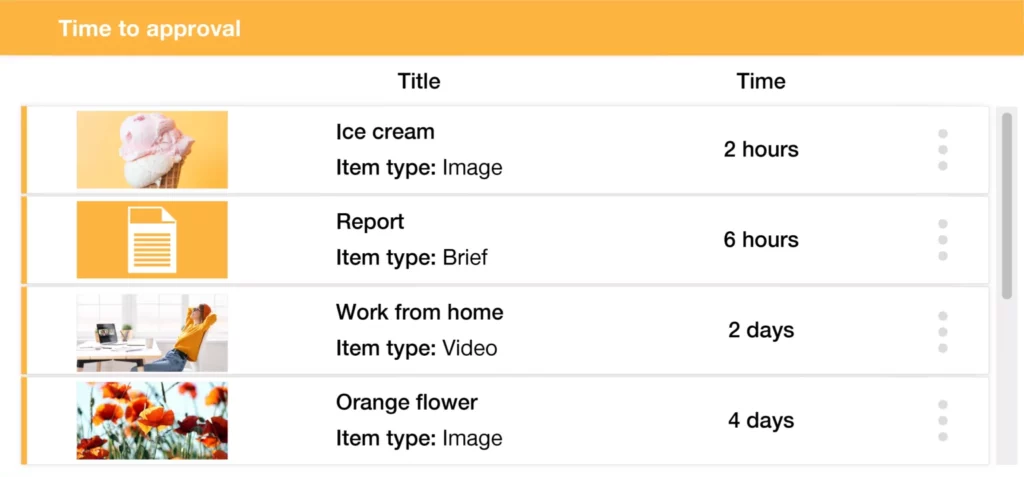
What are the Benefits of Marketing Compliance Software?
Marketing compliance software is more than just a tool to keep your campaigns within legal and brand guidelines — it’s a strategic asset that can transform how your marketing team operates. Beyond the obvious advantages of speeding up approvals and reducing risks, here are some additional benefits that highlight the transformative power of these platforms:
Empowers Teams with Self-Service Capabilities
Marketing compliance software often includes self-service features, such as pre-approved templates, dynamic brand guidelines, and accessible digital asset libraries. This empowers team members to create compliant content independently, without constantly relying on legal or brand teams for approvals. For example, a regional marketer can quickly localize a campaign using pre-approved assets and templates, ensuring compliance while maintaining agility.
Improves Cross-Departmental Collaboration
By centralizing workflows and providing a single source of truth, marketing compliance software bridges the gap between marketing, legal, and brand teams. It eliminates the back-and-forth emails and disjointed feedback loops, fostering a more collaborative environment. For instance, legal teams can set up automated compliance checks, while marketers can focus on creativity, knowing that their work aligns with regulations.
Enhances Scalability for Growing Businesses
As your business expands into new markets or scales its content production, manual compliance processes become unsustainable. Marketing compliance software scales with your organization, accommodating increased content volume, regional regulatory variations, and additional team members. This ensures that compliance remains consistent, even as your operations grow more complex.
Provides Real-Time Compliance Monitoring
One of the standout features of modern marketing compliance software is its ability to monitor content in real time, even after it’s gone live. This is particularly valuable for ‘always-on’ digital campaigns, such as Google Ads and web pages. Content can be scheduled for periodic review and prevent potential compliance breaches.
Boosts Brand Trust and Reputation
Consistency is key to building trust with your audience. Marketing compliance software ensures that every piece of content — whether it’s a small banner ad, a product brochure, or a major campaign — adheres to your brand guidelines and legal requirements. This consistency not only strengthens your brand identity but also protects your reputation by minimizing the risk of misleading or non-compliant messaging.
Simplifies Audit Preparation
When it comes to audits, having a centralized system that tracks every step of the content creation and approval process is invaluable. Marketing compliance software automatically logs all actions, from initial briefs to final approvals, creating a clear audit trail. This makes it easy to demonstrate compliance during regulatory reviews, saving time and reducing stress.
Reduces Content Waste
Without a centralized system, marketers often recreate assets or duplicate efforts because they can’t locate existing compliant materials. Marketing compliance software eliminates this inefficiency by organizing all approved assets in a searchable digital library. This not only saves time but also reduces the costs associated with redundant content creation.
Supports Global and Regional Compliance
For businesses operating in multiple jurisdictions, keeping up with regional regulations can be a logistical nightmare. Marketing compliance software can be configured to account for local laws, ensuring that content is tailored to meet the specific requirements of each market. This is especially useful for global campaigns that need to adapt to different advertising standards, privacy laws, or cultural sensitivities.
Encourages Proactive Compliance Culture
By integrating compliance checks into everyday workflows, marketing compliance software fosters a culture of accountability and awareness. Team members become more mindful of regulations and brand guidelines, reducing the likelihood of errors. Over time, this proactive approach becomes ingrained in your team’s processes, making compliance second nature.
Enables Faster Time-to-Market
In today’s turbo-charged digital environment, speed is critical. Marketing compliance software streamlines the entire content lifecycle, from ideation to publication, by automating repetitive tasks and reducing bottlenecks. This means your campaigns can go live faster, giving you a competitive edge without compromising on compliance.
Offers Customizable Compliance Solutions
Every organization has unique compliance needs, and marketing compliance software is designed to adapt to those requirements. Whether you need to enforce specific legal disclaimers, monitor influencer partnerships, or ensure accessibility standards, the software can be tailored to address your specific challenges.
Provides Data-Driven Insights
Many marketing compliance platforms include analytics and reporting features that provide insights into your compliance performance. For example, you can track how often certain regulations are flagged, identify recurring issues, or measure the efficiency of your approval workflows. These insights enable continuous improvement, helping you refine your processes over time.
How do I Choose the Right Solution?
Selecting the right suite of marketing compliance software is a critical decision that can significantly impact your organization’s ability to maintain regulatory compliance and streamline marketing operations. Here are key factors to consider when evaluating software options:
Assess user-friendliness and ease of adoption
Opt for an intuitive interface that aligns with your team’s workflow and is easy to learn.
Prioritize customization and scalability
Look for software that can be tailored to meet your specific compliance needs and can grow with your organization.
Evaluate compatibility with existing tools
Ensure seamless integration with your current marketing tools and systems for efficient data synchronization.
Review security and data protection measures
Choose software with robust data security features to protect sensitive customer information.
Examine compliance tracking and monitoring capabilities
Select software that provides real-time monitoring of regulatory changes and alerts for prompt compliance adjustments.
Assess reporting and analytics features
Ensure the software offers customizable compliance reports and data insights for better decision-making.
Research reputation and customer support
Look for a reputable provider with positive reviews, longevity, a solid client base and responsive customer support.
Conduct a cost benefit analysis
Evaluate the overall value the software provides in terms of time saved and improved compliance and marketing effectiveness.
What are Marketing Compliance Software Best Practices?
Implementing marketing compliance software is a significant step towards ensuring regulatory adherence and streamlining marketing operations. To make the most of this powerful tool, you should consider these best practices:
- Establish a compliance culture within your organization:
Prioritize compliance, communicate its importance, and conduct regular training to create a culture of compliance among employees. - Train employees how to use it:
Provide comprehensive training to empower employees with the skills to maximize the software’s benefits and streamline compliance workflows. - Regularly update to stay compliant with change:
Stay informed about regulatory updates and promptly apply software updates to maintain ongoing compliance. - Monitor and audit compliance efforts:
Conduct regular audits using the software to identify non-compliance areas and measure compliance performance. - Collaborate across teams:
Encourage seamless collaboration between marketing, legal, compliance, and relevant teams for efficient content review and approvals. - Integrate compliance into the creative process:
Embed compliance checkpoints throughout the marketing creative process to ensure compliance is considered from the outset. - Document compliance efforts:
Maintain comprehensive records using the software’s capabilities to document compliance measures, approvals, and audit results.
Why is it Important to Uphold Compliance?
Embracing marketing compliance is the only way forward – after all, it’s mandated so you have no choice. Remaining compliant is one of the single most important acts you can perform as a marketer. It can protect the company’s bottom line and reputation in ways that dwarf a big budget brand campaign. So instead of looking at it as a box to be ticked, a culture of compliance can put you on the front foot, improve business processes, elevate reputation and help gain a competitive advantage.
By streamlining processes, reducing compliance risks, ensuring brand consistency, and leveraging data insights, marketing compliance software marketing and legal helps teams do more than just cope, it ensures they excel. Contact us to find out more.

